Choosing the wrong oil for your standby engine can silently lead to higher maintenance costs, safety risks, and shorter engine life. Using incompatible or low-quality oil causes increased wear, sludge buildup, and potential engine failure. Ignoring proper oil types and change intervals traps you with costly repairs and unplanned downtime. To keep your engine safe and efficient, it’s essential to select the right oil and follow recommended practices—learn more to avoid these hidden expenses.
Key Takeaways
- Using low-quality or incompatible oils can cause sludge buildup, leading to clogged passages and costly engine repairs.
- Synthetic oils, while initially more expensive, reduce long-term costs by extending engine life and decreasing maintenance frequency.
- Neglecting regular oil changes with inappropriate oil types accelerates wear, increasing the risk of engine failure and expensive repairs.
- Improper disposal of used oil from different types can harm the environment and lead to legal penalties.
- Failing to follow manufacturer-approved oil specifications and compatibility increases hidden costs due to engine damage and reduced safety.
The Impact of Oil Viscosity on Engine Wear and Tear
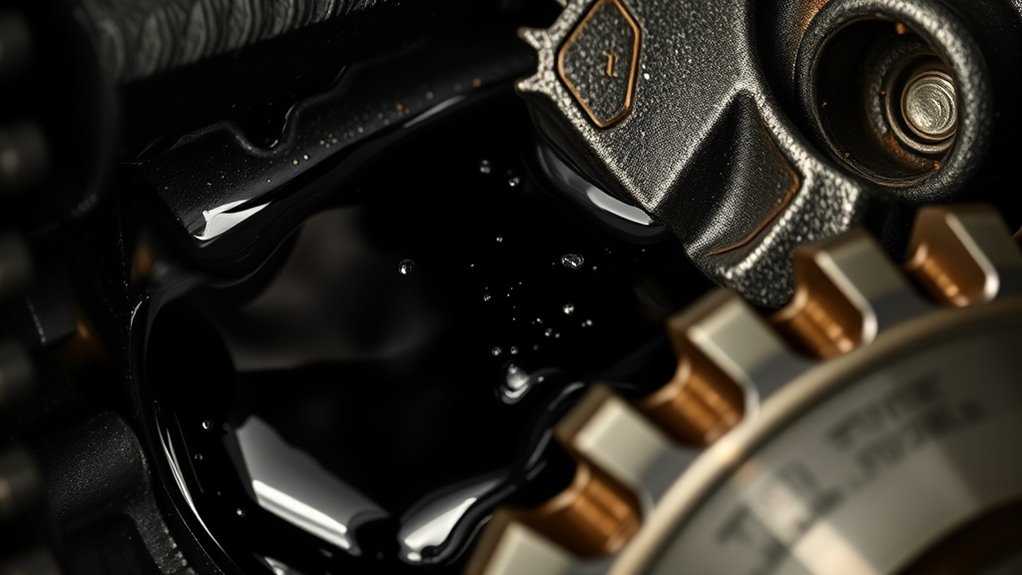
Oil viscosity directly affects how well an engine’s moving parts are protected from wear. If the oil is too thick, it won’t circulate smoothly, leading to increased friction and faster engine wear. Conversely, if the oil is too thin, it may not provide enough lubrication during high temperatures or heavy loads, risking metal-to-metal contact. Choosing the right oil viscosity ensures the engine maintains ideal lubrication across varying conditions. Proper viscosity minimizes engine wear by reducing friction, preventing premature component failure, and extending your engine’s lifespan. Always follow the manufacturer’s recommendations for viscosity, especially for standby engines that sit idle for long periods. Using the correct oil viscosity is a simple yet critical step to safeguard your engine from unnecessary wear and costly repairs. Regularly inspecting oil quality and viscosity can help identify potential issues before they cause significant damage.
How Synthetic vs. Conventional Oils Affect Maintenance Costs
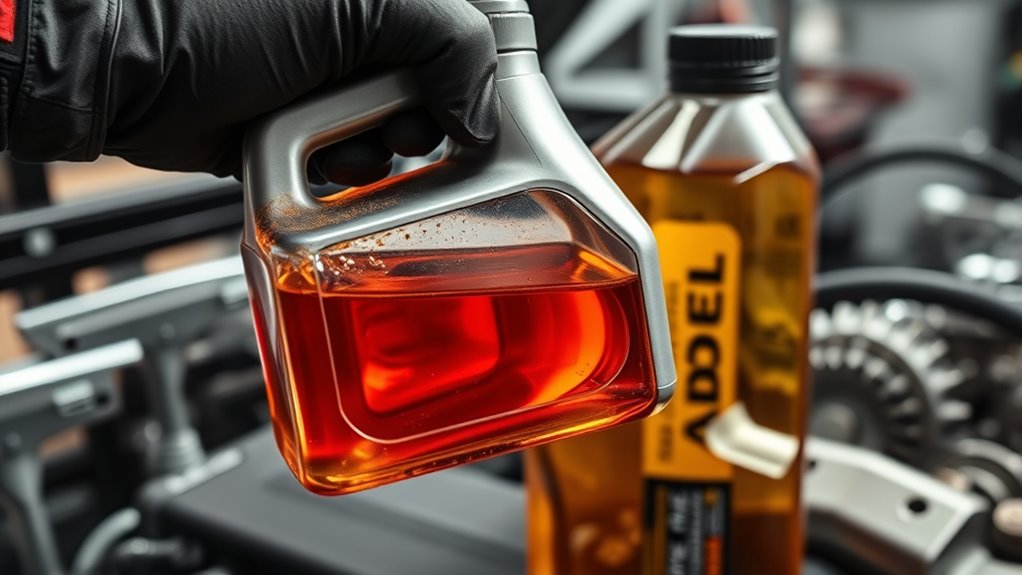
Choosing between synthetic and conventional oils can considerably impact your maintenance costs. Synthetic oils often cost more upfront but may extend engine life and reduce the frequency of oil changes. Understanding these differences helps you make smarter decisions that save you money in the long run. Additionally, selecting the appropriate best laundry detergents can also influence engine cleanliness and longevity, further affecting maintenance expenses.
Cost of Oil Change
When comparing the costs of oil changes for standby engines, synthetic oils often come with a higher upfront price than conventional alternatives. However, they can reduce long-term expenses by lasting longer between changes. You’ll need to replace the oil filter more carefully to guarantee maximum performance, which can add to maintenance time and costs. Additionally, synthetic oils tend to be less aggressive on the drain plug, decreasing wear over time. While the initial oil and filter costs are higher, synthetic oils may lower overall maintenance expenses due to fewer oil changes. On the other hand, conventional oils are cheaper upfront but require more frequent changes, increasing labor and material costs. Evaluating these factors helps you choose an option that balances initial expense with long-term savings. Regular appliance maintenance plans can also help ensure your standby engine operates safely and efficiently over time.
Engine Longevity Impact
Synthetic oils generally help extend engine life by providing better lubrication and reducing wear over time, which can lead to lower maintenance costs. They maintain ideal engine temperature and support superior oil filtration, preventing deposits that accelerate wear. This results in less frequent oil changes and repairs. In contrast, conventional oils break down faster, increasing engine stress and degradation. To maximize longevity, consider these factors:
| Aspect | Synthetic Oil | Conventional Oil |
|---|---|---|
| Oil Filtration | Better at trapping particles | Less effective at trapping debris |
| Engine Temperature | Maintains stable temperature | Fluctuates more, risking overheating |
Additionally, synthetic oils typically contain fewer impurities, leading to a cleaner engine environment and further reducing potential engine damage.
The Risks of Using Incompatible Oil Types in Standby Engines
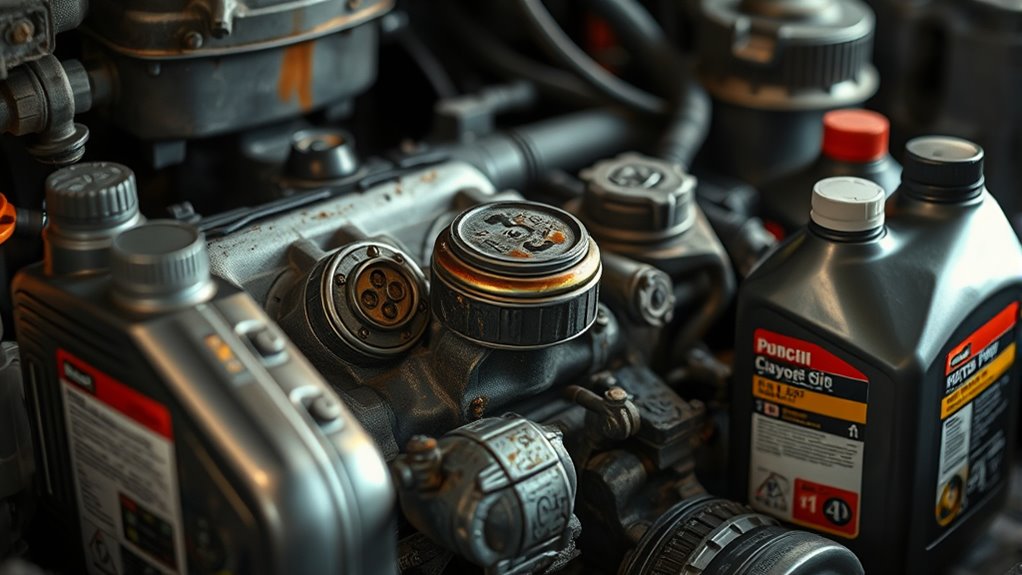
Using incompatible oil types in standby engines can lead to serious mechanical issues that compromise performance and safety. When oil compatibility isn’t maintained, harmful chemical reactions may occur, causing the additive effects to become unpredictable. This unpredictability can result in sludge buildup, reduced lubrication, and increased wear on engine parts. Mixing oils with different formulations may diminish their protective qualities, making the engine more vulnerable to corrosion and breakdown. Incompatible oils can also interfere with the engine’s sealing and filtration systems, leading to leaks and contamination. To avoid these risks, always use the oil recommended by the manufacturer and ensure that oil types are compatible. Proper oil selection preserves engine integrity, prolongs lifespan, and prevents costly repairs caused by incompatible formulations. Additionally, understanding oil compatibility is essential for maintaining engine health and safety.
Hidden Expenses From Poor Oil Quality and Contamination
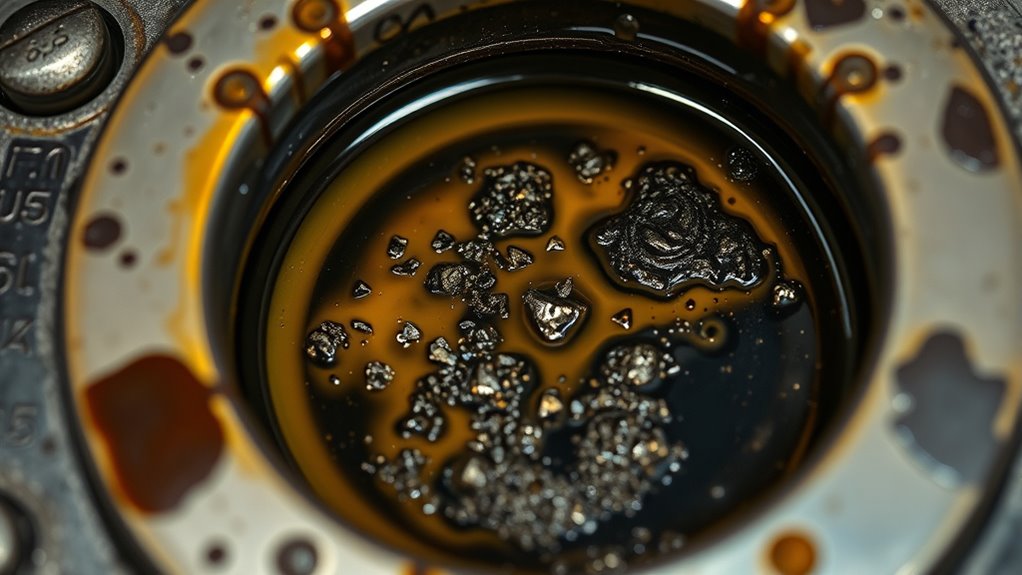
Poor oil quality or contamination can quietly cause your engine to wear out faster. This leads to increased maintenance costs and unexpected repairs that eat into your budget. Recognizing these hidden expenses helps you avoid unnecessary downtime and expenses. Using vetted oil products ensures optimal protection and performance for your standby engines, reducing the risk of costly issues.
Increased Engine Wear
When oil quality is compromised or contamination occurs, your engine faces accelerated wear that can lead to costly repairs and downtime. Poor-quality oil can’t effectively lubricate moving parts, causing friction and increasing engine overheating. Contaminants can clog oil passages, leading to oil leakage and insufficient lubrication. Over time, this results in metal fatigue, damaged pistons, and worn bearings. To understand the impact, consider this table:
| Issue | Cause | Effect |
|---|---|---|
| Engine Overheating | Low-quality oil or debris | Increased wear, breakdown |
| Oil Leakage | Seal degradation or contamination | Reduced lubrication, damage |
| Part Wear | Insufficient lubrication | Faster component deterioration |
| Corrosion | Contaminants causing rust | Damage to engine internal parts |
| Reduced Efficiency | Oil breakdown over time | Higher fuel costs, downtime |
Avoid these costs by ensuring high-quality, clean oil for your standby engine.
Elevated Maintenance Costs
Elevated maintenance costs are a direct consequence of neglecting oil quality and allowing contamination to persist. When you use poor-quality oil or ignore regular oil filter replacements, debris and sludge build up faster, increasing engine wear. Contaminated oil forces you to perform more frequent maintenance, which adds up over time. Additionally, improper oil disposal can lead to environmental fines and cleanup expenses. Dirty oil strains engine components, leading to costly repairs or replacements. To avoid these hidden costs, prioritize high-quality oil and change your oil filter regularly. Proper disposal of used oil ensures compliance and reduces environmental impact. Regularly monitoring water content and contamination levels in your oil can help detect issues early before they cause significant damage. Taking these steps helps keep your standby engine running smoothly, reducing downtime and maintenance expenses in the long run.
The Costly Consequences of Ignoring Proper Oil Change Intervals
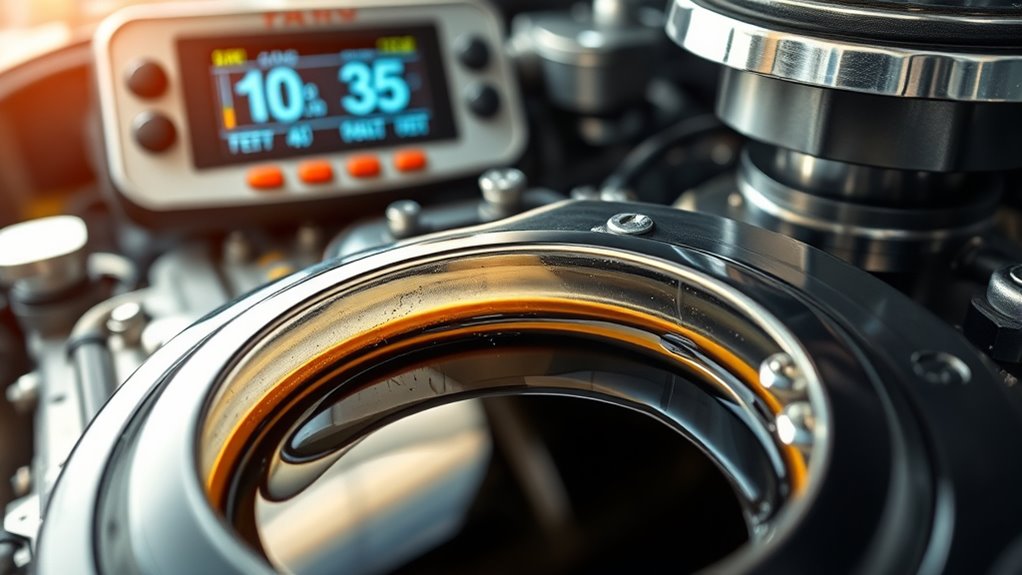
Neglecting proper oil change intervals can lead to severe engine damage and costly repairs. Old, degraded oil loses its ability to lubricate, causing increased friction and wear on engine parts. Over time, this deterioration results in reduced engine efficiency, potential breakdowns, and expensive fixes. Additionally, neglecting oil changes can lead to contaminated oil that must be disposed of properly to avoid environmental impact. Improper disposal of used oil harms ecosystems and violates regulations. By ignoring recommended intervals, you risk not only damaging your engine but also contributing to environmental pollution. Regular oil changes keep your engine running smoothly, extend its lifespan, and minimize the hazardous waste generated. Using air purifier maintenance practices can help prevent dirt and debris from contributing to engine wear. Staying proactive with maintenance saves money and helps protect the environment.
Selecting the Right Oil to Maximize Safety and Minimize Unexpected Expenses
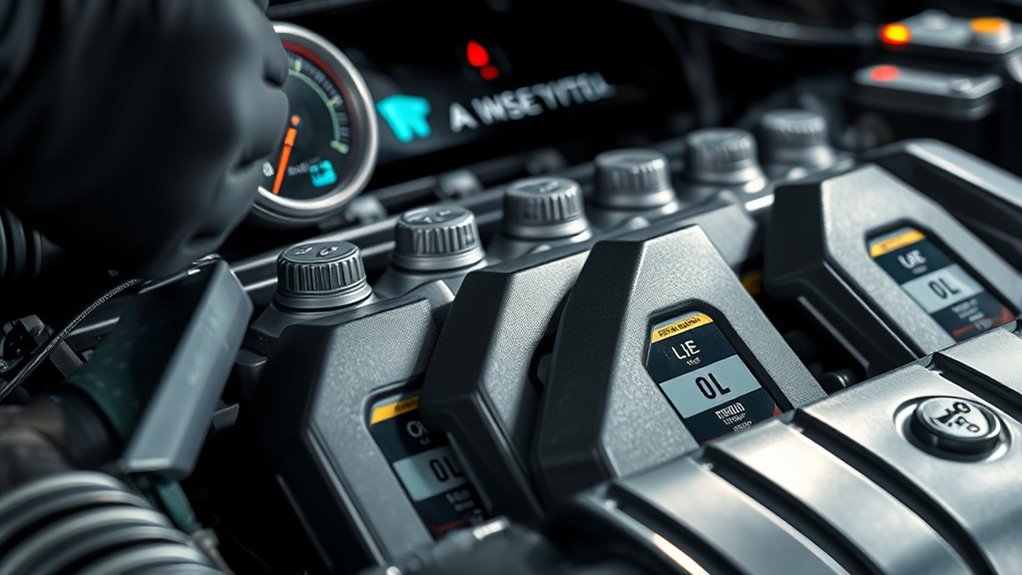
Choosing the right oil for your standby engine is vital to ensuring safety and avoiding costly repairs. Start by selecting an oil compatible with your engine’s specifications, paying attention to viscosity and quality. An appropriate oil filter helps trap dirt and prevents contaminants from circulating, extending engine life. Consider oils with added oil additives, such as anti-wear agents and corrosion inhibitors, which enhance performance and protect internal components during long periods of inactivity. Using the correct oil type reduces the risk of engine failure, minimizes unexpected expenses, and guarantees reliable operation when you need it most. Regularly check and replace both the oil and oil filter according to manufacturer guidelines to maximize safety and safeguard your investment. Additionally, understanding the types and features of oils can help you choose the most suitable option for your engine’s needs.
Frequently Asked Questions
How Do Oil Additives Impact Standby Engine Safety Costs?
Oil additives can considerably impact standby engine safety costs by affecting oil additive interactions and additive compatibility. If you use incompatible additives, it can lead to engine wear, corrosion, or deposits, increasing maintenance and repair expenses. To avoid these hidden costs, always make certain the additives you choose are compatible with your engine’s oil and follow manufacturer guidelines. Proper selection and maintenance help prevent costly issues and extend your engine’s lifespan.
Can Environmental Factors Influence Oil Choice and Hidden Expenses?
Think of the environment as a silent partner in your engine’s story. Environmental factors like humidity, temperature, and pollution can influence your oil choice and hidden expenses. They impact oil degradation, requiring more frequent changes or specialized formulations. Conducting a thorough cost analysis helps you weigh environmental impacts against operational needs, avoiding unexpected expenses. By choosing oils suited to your environment, you protect your engine and reduce hidden costs, ensuring long-term safety and efficiency.
What Are the Long-Term Financial Effects of Frequent Oil Leaks?
Frequent oil leaks can lead to costly repairs over time, draining your budget and risking engine damage. You might spend more on parts, labor, and potential replacements if leaks aren’t addressed early. To minimize these expenses, focus on leak prevention by maintaining proper oil levels, inspecting seals regularly, and using suitable oil types. Staying proactive helps you avoid long-term financial strain and keeps your standby engine running smoothly.
How Does Storage Condition Affect Oil Quality and Safety?
Storing oil improperly can lead to storage degradation, which reduces its quality and safety. If you leave oil exposed to heat, moisture, or sunlight, it’s more likely to degrade faster. This increases contamination risks, potentially damaging your standby engines. To avoid these issues, keep oil in a cool, dry, sealed container away from direct sunlight. Regularly check storage conditions and replace oil if it shows signs of contamination or degradation.
Are There Legal or Insurance Implications Related to Oil-Related Engine Failures?
Think of your engine as a trusted ship steering stormy seas. If an oil-related failure causes damage, you’re liable for legal issues and insurance claims. You could face legal liabilities if negligence is proven, and insurance coverage might be denied if proper maintenance or oil standards weren’t followed. To avoid this, make certain your oil is appropriate, stored correctly, and regularly maintained, shielding you from costly legal and insurance repercussions.
Conclusion
Choosing the right oil isn’t just about keeping your standby engine running; it’s about safeguarding your investment from hidden costs lurking beneath the surface. Think of the oil as the blood that keeps your engine alive—using the wrong type or neglecting changes can lead to silent damage and costly breakdowns. Stay vigilant, select wisely, and make certain your engine’s health blossoms, not withers, in the face of unseen expenses.









